Aishah Hasnie cage dives with sharks in Hawaii
‘Fox News Live’ host Aishah Hasnie shares her experience swimming with sharks in Hawaii.
Paul de Gelder of California lost two limbs in a sudden and awful shark attack in February 2009 while taking part in a routine underwater exercise as an elite Australian Navy clearance diver.
Others in such a position — after suffering this devastating loss — may have wanted little or nothing to do with sharks.
Yet de Gelder developed a completely different view. He wanted to get closer to the animal — and learn all he could about it.
CLOSE CALL! HAWAII DIVER NEARLY LANDS IN TIGER SHARK'S OPEN MOUTH IN THIS VIDEO
Today, he's passionately devoted to saving sharks all over the world partly because of "the ripple effect" their existence has on humans.
He is someone, he said, who "had my life changed in a very violent, painful and dramatic way," he told Fox News Digital in a phone interview a few days ago from his home in California.
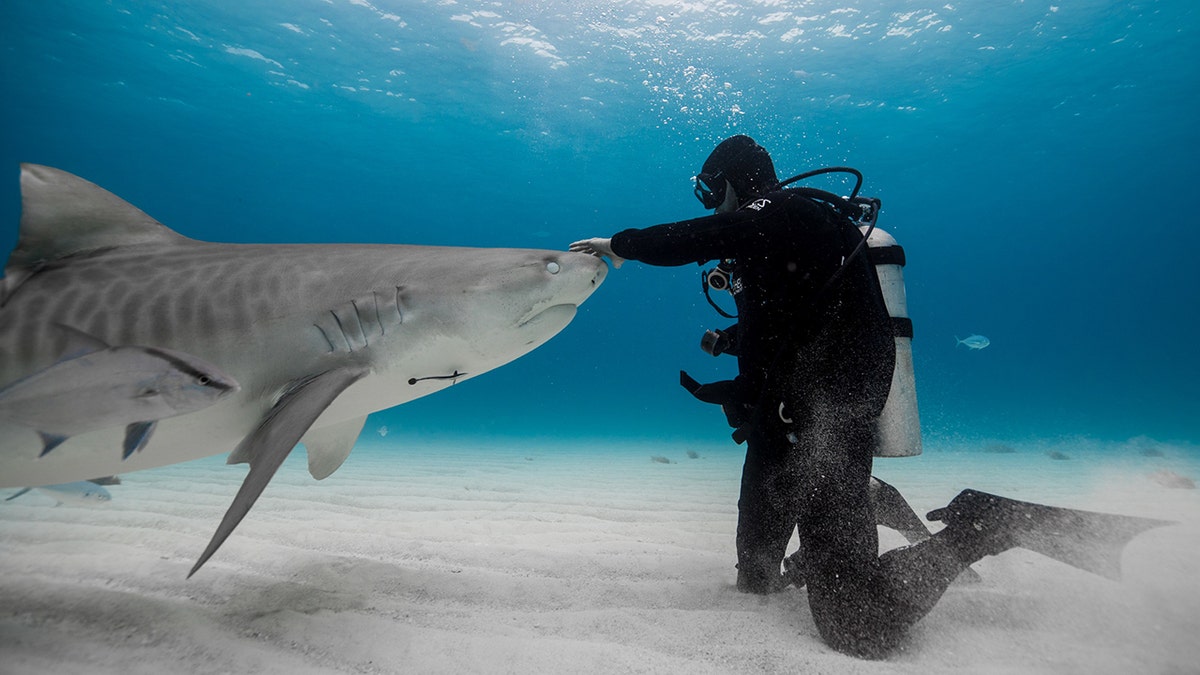
Paul de Gelder of California is shown interacting with a shark. "My goal," he told Fox News Digital, is "to show people the other side of sharks and my really amazing stories about them." He is hoping for people "to potentially fall in love with them and want to protect them, just like I do." (Paul de Gelder / HarperCollins)
"And if I can come from a place where I knew nothing about sharks, I didn't care about them — I figured, if we wiped them all out, then we wouldn't have to worry about being eaten — to going through what I went through and then understanding how actually important they are to the oceans, to the ecosystems and to us as well — if I can work that out, then surely my passion about this subject will relay down onto other people so that they'll want to understand and learn more and protect these animals as well."
"Fear can be a very powerful motivator … My fear was that I was going to lose my career."
He added, "As Steve Irwin said — and this is something that has always stuck with me — ‘If you can make someone fall in love with something, they’ll want to protect it.'"
SHARK CIRCLES NEAR UNSUSPECTING SWIMMERS
And so, "really my goal here is just to show people the other side of sharks and my really amazing stories about them," he said, "so that they'll potentially fall in love with them and want to protect them, just like I do and all of my friends do on ‘Shark Week.’"
He's doing so every day, through his motivational speaking, his new book, "Shark: Why We Need to Save the World’s Most Misunderstood Predator" (HarperCollins), his work for the Discovery Channel on "Shark Week" — and countless other endeavors in which he shares his passion for the animal.
Tried to fight back
While de Gelder was on a training exercise as a Navy diver in Sydney Harbor more than 10 years ago, a 9-foot bull shark grabbed him by his arm and leg.
He tried to fight back but was pulled underwater and violently shaken.
Then the shark ripped off most of de Gelder's right arm as well as his right leg.

Paul de Gelder is shown today on the left — and in earlier years with the Australian Army. He said that "in eight seconds," so much that he cared about was "stolen away" from him. He worked hard to get it all back. (Paul de Gelder / HarperCollins )
He spent time during his long, hard recovery learning all about sharks.
"Fear can be a very powerful motivator sometimes," he said. "And my fear was that I was going to lose my career."
He added, "I had fought so hard to drag myself up and out of a life where I felt I had no purpose or value, to joining the [Australian] Army and becoming a paratrooper, passing selection for the elite clearance divers and then having this amazing life and purpose — and then, in eight seconds, having all of that stolen away [during the shark attack]."
So it was fear, he said, "of going back to that life of not having any purpose to training my absolute butt off to prove to the Navy that I could still do my job."
He said, "I pulled that off after six months, when a lot of people said it was impossible."
He left full-time military service in 2012 and was a reserve Navy diver for a few years.
He said he'd have his best buddy taken him to the gym so he "could work out and learn to use my body again."
CALIFORNIA PHOTOGRAPHER SNAPS PIC OF SHARK JUMPING OUT OF WATER BEHIND SURFER
He also said, "Technology is incredible these days. And the military gave me all the best prosthetics I needed to be able to walk and get exercise and all that. So I used all the tools at my disposal."
He said he left full-time military service in 2012 and was a reserve Navy diver for a few years.
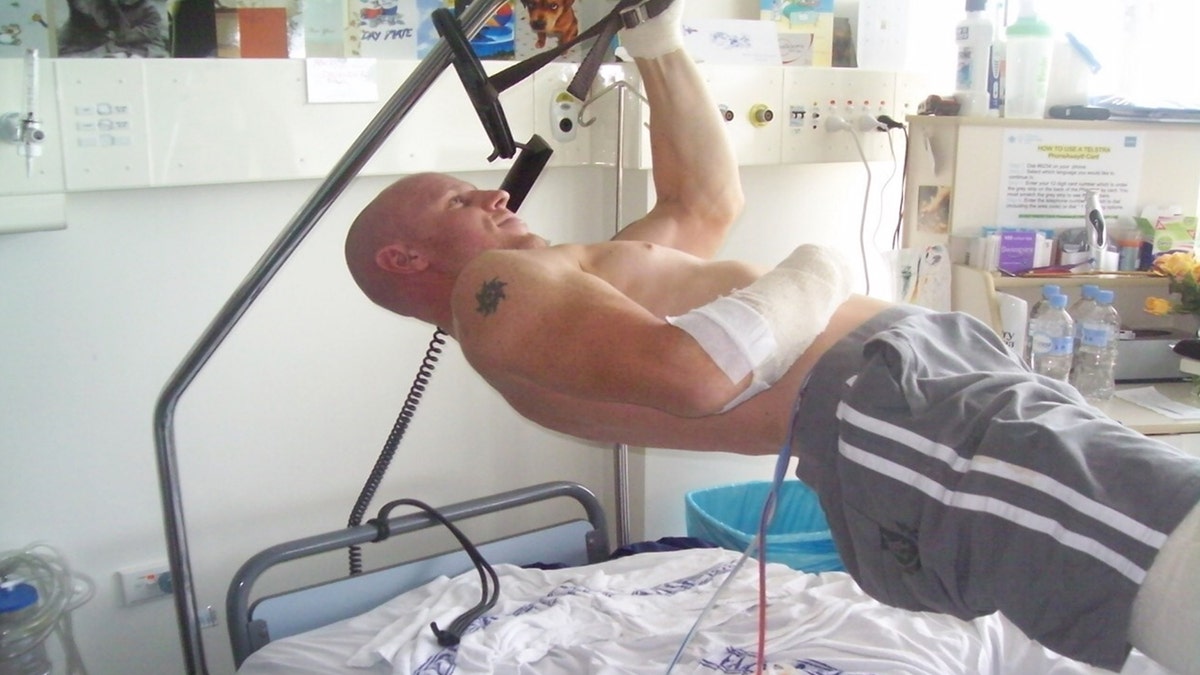
Paul de Gelder is shown during his rehab and recovery after a shark tore off two of his limbs in February 2009 during a routine military exercise. (Paul de Gelder / HarperCollins)
"Now I live in LA and travel around America speaking and working on ‘Shark Week'" for the Discovery Channel.
He is also engaged to be married to "an amazing American girl," he said.
How to help
In his view, what can the average person do in regard to sharks and conservation efforts?
"There's a bunch of things that people can do," he said.
"Down at the very basic level, for those who don't travel that much or may be landlocked but also love sharks — they can follow all the pages that support shark conservation. They can share the information that they provide and they can sign petitions."
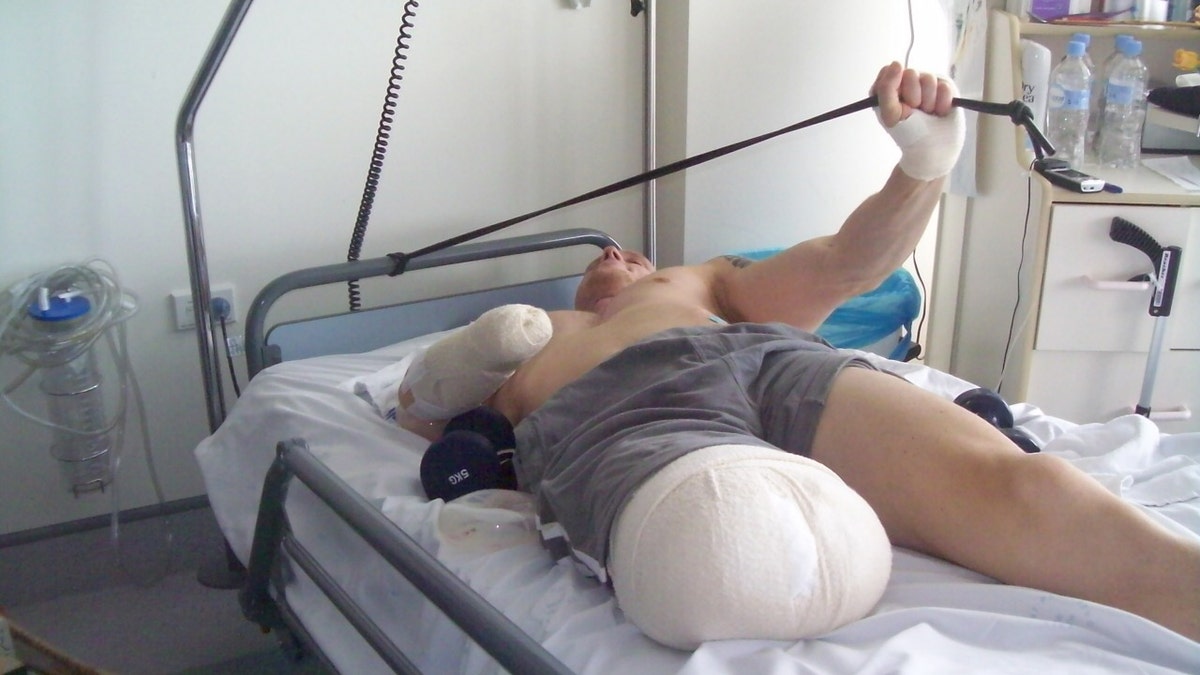
Another view of Paul de Gelder during his rehab and recovery. (Paul de Gelder / HarperCollins)
While "this may seem small," he said, "the way that things change is when a lot of people do small things consecutively."
So "signing these petitions actually really does make a difference in studies for when we want to get more sharks put under the protection act or when we want to change legislation to protect sharks."
He added, "The petitions were part of the reason, he said, that America has just come out and said there will be no exports or imports of shark fins, ever — and so, those things really do make a difference."
"The way that things change is when a lot of people do small things consecutively."
He also said, "If you're a little more adventurous — you can go into the shark tourism industry. You can provide your time and have an amazing experience — and that supports them and their conservation efforts."
He also said that "moments" spent near and around sharks — safely, of course — "are priceless."
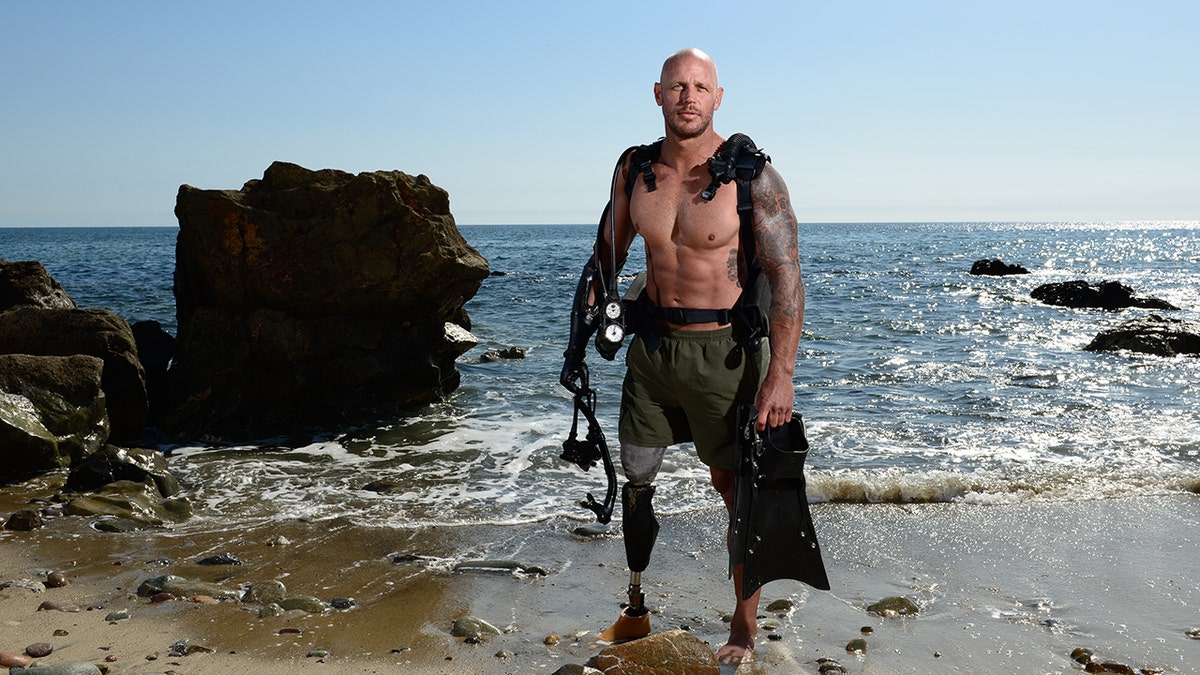
Paul de Gelder today. "Of all the creatures on our wonderful planet, I would argue that none has captured the human imagination quite like the shark," he says in his new book, "Shark." (Paul de Gelder / HarperCollins)
As part of his travels as shark advocate and passionate environmentalist, he has given talks to the United Nations, the U.S. Navy and large corporations and charities.
Now, read these two exclusive excerpts from de Gelder's new book.
‘The perfect predator’ from ‘Sharks’
Paul de Gelder: As a kid I used to dream about a shark eating me alive. But when that nearly happened in 2009, as I encountered that bull shark in Sydney Harbor, it was not a fun experience whatsoever.
That day I found myself on a different tier in the food chain to the one which I’m accustomed to.
You see, we may have cars and phones and even space stations, but when it comes to being a lonely predator, we humans are pretty useless.
"Though some sharks have good eyesight, their sensory organs enable them to detect even the smallest movement or scent before they even see what caused it."
We’re slow. We’re not as agile as our food.
We’re not even very strong. Our brain and our ability to work together have helped us survive and thrive as a species, but without tools we are a very lame predator.
Not the shark. Millions of years of glorious evolution have crafted the shark into the perfect predator.
Their streamlined body allows them to cruise through the water like a torpedo when it’s time to strike their prey. Their rough skin is so incredibly adapted to swimming that human swimmers have been banned from using imitations of it in competitions.
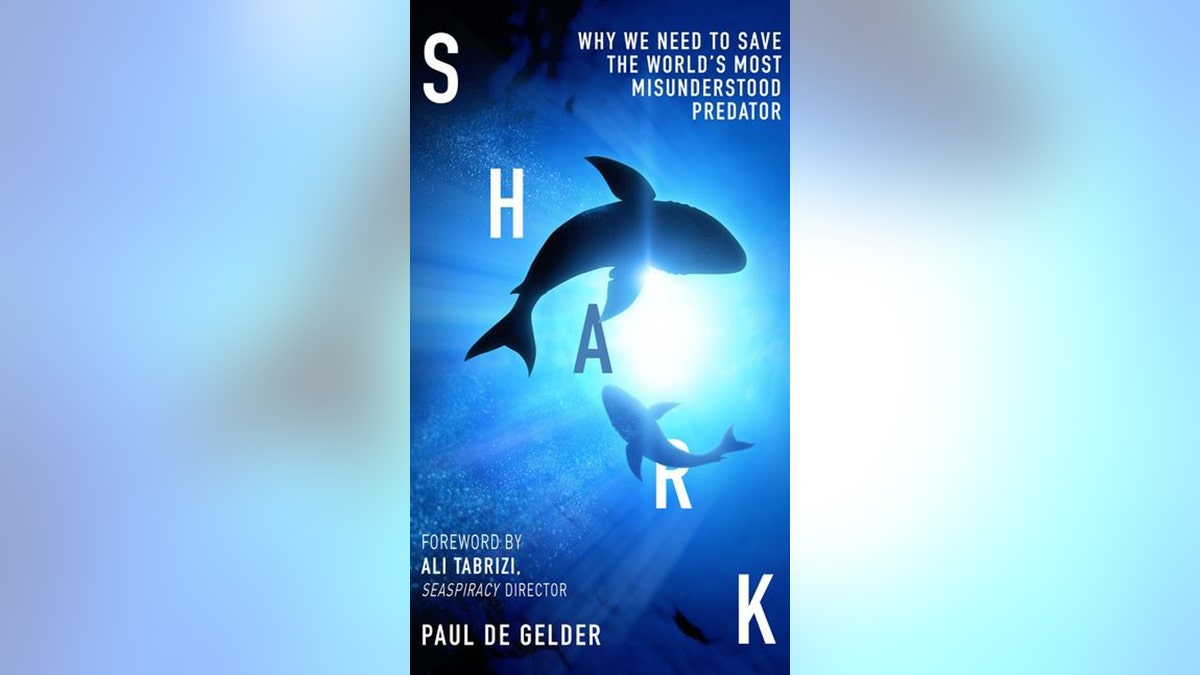
Paul de Gelder's new book is "Shark: Why We Need to Save the World's Most Misunderstood Predator" (HarperCollins). (Paul de Gelder / HarperCollins)
Though some sharks have good eyesight, their sensory organs enable them to detect even the smallest movement or scent before they even see what caused it. Sharks’ sense of smell is so powerful that they can home in on mates and dinner from miles away.
CLICK HERE TO SIGN UP FOR OUR LIFESTYLE NEWSLETTER
Their teeth are like rows of the most expensive knives, perfectly adapted for killing their prey — bent back and needle-like for fish, thick and jagged for marine mammals — with powerful snapping jaws or wide gaping mouths depending on the diet of the particular species of shark.
‘Held them hostage' from ‘Sharks’
Paul de Gelder: Of all the creatures on our wonderful planet, I would argue that none has captured the human imagination quite like the shark.
In fact, sharks have kidnapped our imaginations, held them hostage and led to more nightmares than probably any other animal that’s ever existed (a close second would probably be spiders).
Why are we so terrified about being in the water with them?
"What’s out there? Is it hungry? Will it get me? A new environment can always be a little scary."
You are thousands and thousands of times more likely to die from falling down the stairs than being eaten by a shark, but do you break into a cold sweat every time you go upstairs? When you’re on the stairs, are you in a constant state of fear, worrying what could happen at any second?
For almost all of us the answer is no, but I’m sure most of us have felt that feeling of fear and dread as we step into the ocean. What’s out there? Is it hungry? Will it get me?
A new environment can always be a little scary, and so you can understand why someone who grew up in a landlocked city would be wary of the ocean, but I grew up in and around the sea, and I was bloody terrified of sharks.
CLICK HERE TO GET THE FOX NEWS APP
Why?
Humans have a very powerful imagination.
First published by HarperCollins UK Publishers, 2022. Excerpted from "Sharks" by Paul de Gelder with permission of the publisher.
Former elite soldier and shark attack survivor Paul de Gelder is a host for the Discovery Channel’s "Shark Week." He was also a key personality in Netflix’s "Seaspiracy," and hosts the podcast "The Dirt Down Under."





















